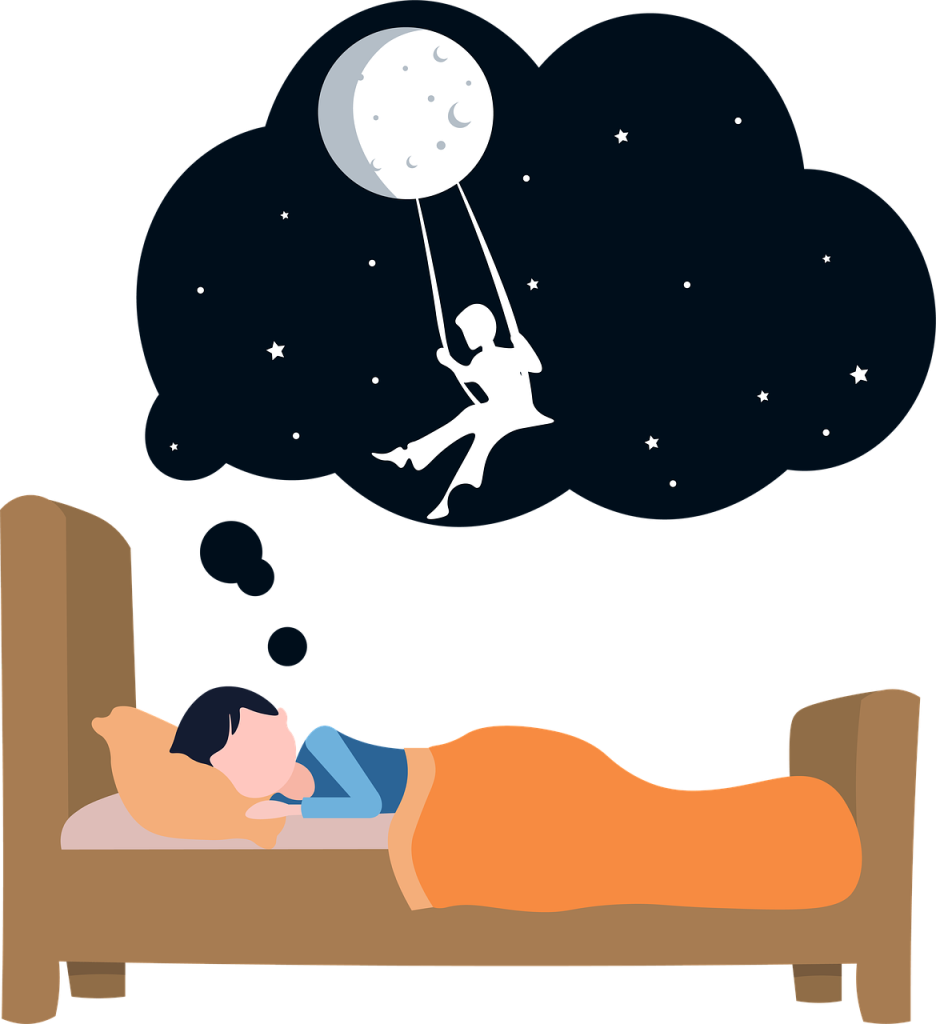Dreaming is one of the most exciting and distinctive parts of sleep. An average night’s sleep includes around two hours of dreaming. The most vivid dreams occur during the rapid eye movement (REM) sleep period, but different types of dreams can occur at any point throughout the sleep cycle.
Dreams can contain imagery that is pleasant, negative, or downright confusing, indicating a period of intense imagination while sleeping. Nonetheless, awake experiences are regularly interwoven into dream material, whether in happy or terrible dreams. You’ll discover what dreams are, why we dream, and how they affect our sleep, mental health, and daily lives. Let’s get started.
What are Dreams?
Dreams are a common human experience that can be defined as a state of awareness characterized by sensory, cognitive, and emotional events that occur while sleeping. The dreamer has less control over the content, visual visuals, and memory activation. There is no cognitive state that has received as much attention and yet is so commonly misinterpreted as dreaming.
The neuroscientific and psychoanalytic approaches to dream analysis differ significantly. Neuroscientists are fascinated by the systems that underpin lucid dream formation, dream organization, and narratability. However, psychoanalysis focuses on the significance of dreams and how they relate to connections in the dreamer’s past.
Why do we have dreams?

Dreaming is an essential aspect of the sleeping process. According to social psychology, the average individual dreams for roughly 2 hours every night of their lives. Dreaming can help you deal with difficult events and complex emotions in your daily life.
Dreams are the feelings, sights, and sounds you experience while sleeping. They can occur at any point throughout the sleep cycle. Still, it is most prevalent during your sleep cycle’s REM (rapid eye movement) period.
During the REM stage, your heart rate becomes shallow and unpredictable, and your blood pressure increases. During your brain attempts to keep you awake, your muscles stay paralyzed, protecting you from unusual motions while you sleep.
How Long Do Dreams Last?
REM sleep lasts only a few minutes at the beginning of the night, but it increases longer as we sleep. It might linger more than 30 minutes later in the evening. As a result, you may spend half an hour in a single dream.
Why Do You Need to Sleep?
If you’ve ever felt hazy after a lousy night’s sleep, you’ll understand how sleep affects brain function. First, enough sleep is essential for “brain plasticity,” or the brain’s capacity to adjust to stimulus. We cannot comprehend what we have learned during the day and have more difficulty remembering it in the future if we sleep insufficiently. Sleep, according to researchers, may also increase the elimination of waste products from brain cells, which appears to occur less efficiently while the brain is awake.
Sleep is also essential for the rest of the body. People’s health hazards increase when they don’t get adequate sleep. Depression, seizures, high blood pressure, and migraines all worsen. Immunity is weakened, which increases the probability of disease and infection. Sleep also affects metabolism: even one night of missing sleep can cause a prediabetic condition in a normally healthy person.
Do Dreams Influence Sleeping Patterns?
Dreaming is a typical element of a healthy night’s sleep. Sleep has been related to improved cognitive performance and emotional wellness, and studies have also linked dreams to improved thinking, memory, and emotional processing. As a result, many experts feel that dreaming is either a reflection of or contributes to good sleep.
Not all dreams, however, are made equal. Some dreams may harm sleep. Scary, menacing, or distressing material is shared in bad nightmares. A nightmare occurs when an unpleasant dream forces you to arise from sleep.
Impact of Dreams On Sleep
While dreaming is natural, some atypical aspects of dreaming might interfere with sleep or overall mental health. For example, if you have vivid dreams right after falling asleep, this might indicate narcolepsy, a sleep disorder.
Nightmares, on the other hand, might have a bad influence on sleep. They affect sleep by making it more difficult to fall asleep and transition between sleep cycles. This can cause drowsiness during the day.
Can Dreams Affect Your Moods?
Dreams, according to psychologists, reflect more about a person’s emotional health than rational thinking. Often, highly emotional ideas are carried from the waking state to the dream state, influencing your dream content.
Because of their greater intensity, your negative emotions may be projected more frequently in your dreams. Dreams, according to the mood-regulating functions of dreams theory, can moderate poor emotional health, lowering the severity in real life. Dreams can reduce the intensity of a dreamer’s unpleasant feelings, allowing them to awaken with a more cheerful outlook.
Do Dreams Affect Everyday Life?
The precise impact of dreams on daily life is yet unknown, although there are several ways that dreams might influence our waking hours:
- Healthy dreaming may indicate enough sleep, which promotes clearer thinking, a more positive mood, and general wellness.
- People who recall their dreams are more likely to be creative. Incorporating the innovative thinking of dreams into waking life can help improve creative discoveries.
- Dreaming may lead to more expansive or inspiring thinking, which is the fundamental principle behind the adage “follow your dreams.”
- Dreaming has been shown to improve memory consolidation, making it more straightforward to recall crucial knowledge.
- People suffering from anxiety or post-traumatic stress disorder (PTSD) may experience significant symptoms due to frequent nightmares.
- Nightmares can disrupt sleep, producing daytime tiredness, poor mood, or mental difficulties.
Wrapping Up
In summary, dreaming happens predominantly during REM sleep, when the brain most closely mimics “wakefulness” despite the body’s immobility. Dreaming originates in the forebrain, whereas REM sleep originates in the brainstem. Although the precise roles of dreaming are controversial and unknown, studies of sleep and dreaming have been related to decreased thinking, anxiety, mood fluctuations, and weight gain.
Everyone experiences various dreams. Perhaps you seldom, if ever, remember any of your dreams. Or perhaps you regularly wake up with a vivid memory echoing in your brain. Dreams can mirror your current and previous emotional reactions to things in your life. Processing negative emotions in your dream state can help eliminate nightmares and enhance your mental health.




WONDERFUL Post.thanks for share..more wait .. ?